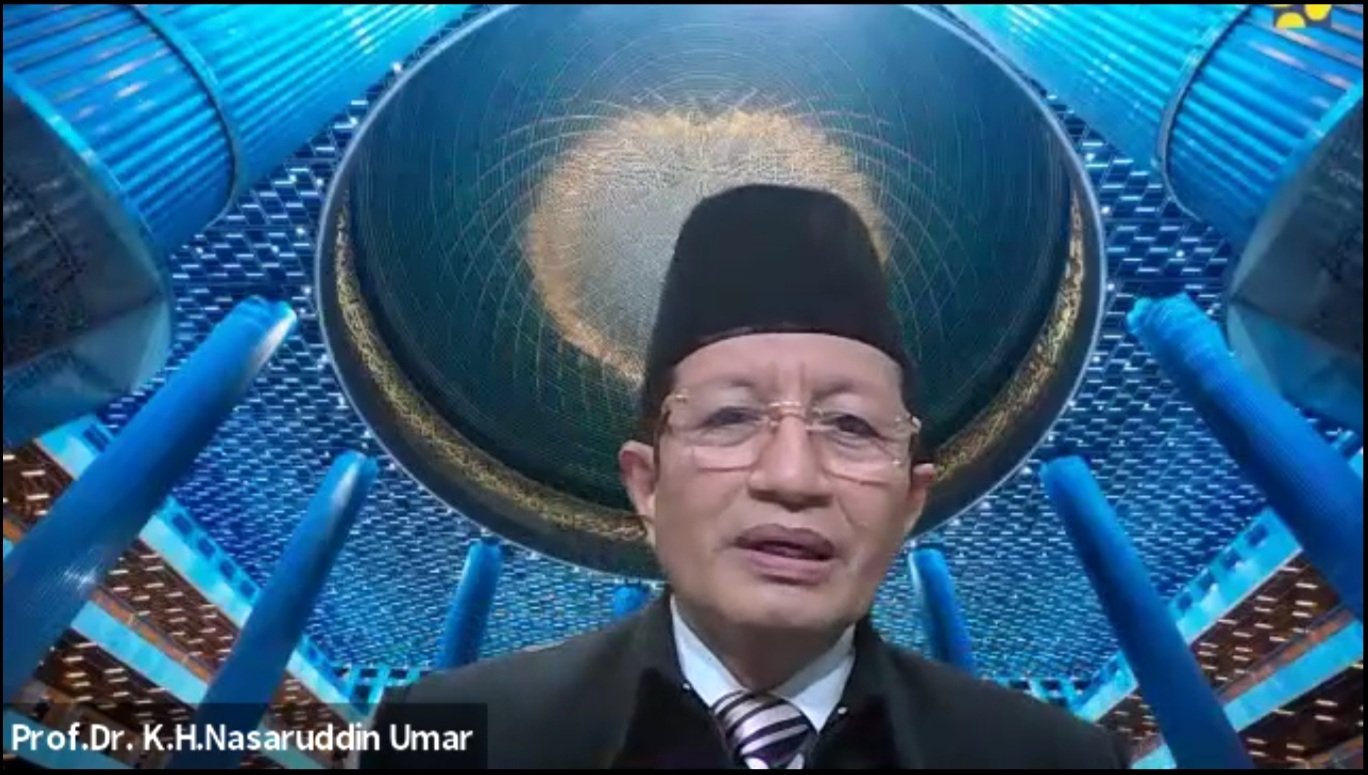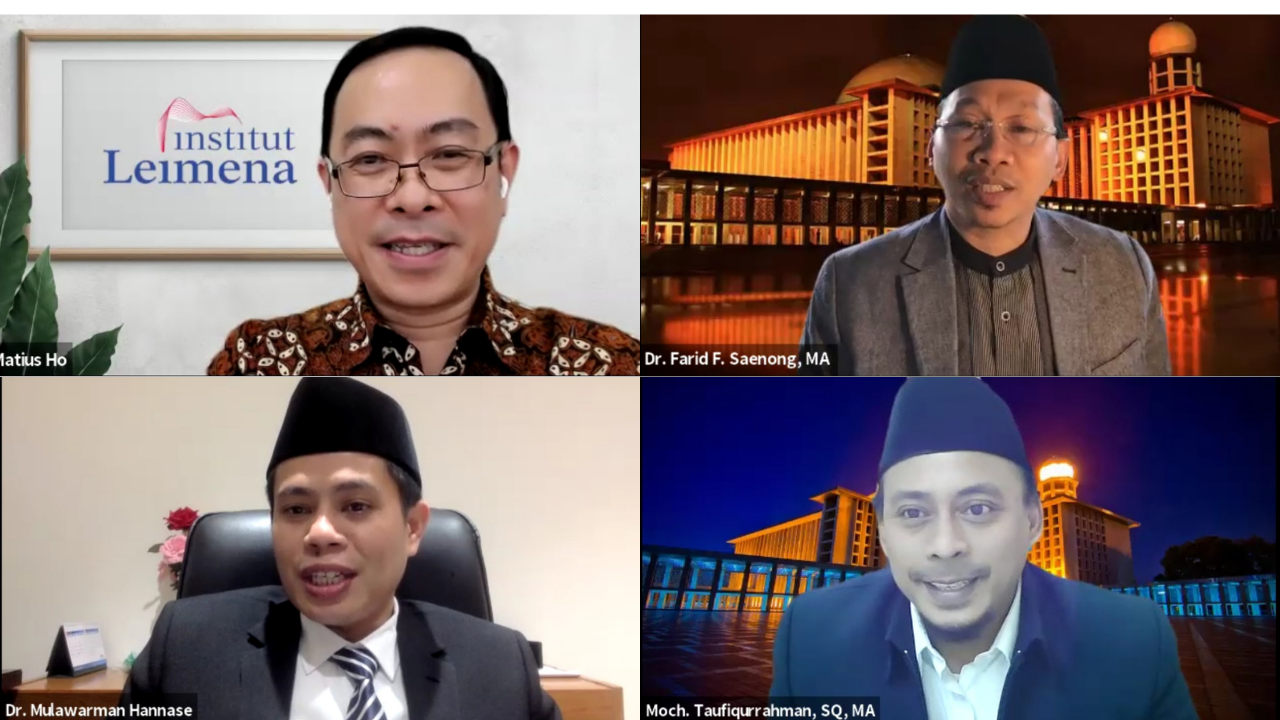
IL News 013/2021
“I want madrasah teachers to be the examples for other teachers.
What we can do is declaring to our students that the Quran has tolerated differences from the beginning,”
Prof. Dr. Nasaruddin Umar
Jakarta, November 26, 2021 – The Grand Imam of the Istiqlal Mosque, Prof. Dr. Nasaruddin Umar, invited madrasah and pesantren teachers to spread the tolerant Islam. Teachers should have a complete philosophy in viewing differences as the Quran is open and acknowledges other religions.
Prof. Nasaruddin conveyed the statement while giving a key lecture at the International Program for the Capacity Building of Madrasah and Pesantren Teachers for Cross-Cultural Religious Literacy (LKLB), which was held by the Istiqlal Mosque and Institut Leimena, Monday (22/11/2021). The current LKLB program was held from November 22-26, 2021, followed by 174 madrasah and pesantren teachers, majority of whom were from Java and Sulawesi, and some others were from Jambi and East Nusa Tenggara (NTT) provinces.
“I want madrasah teachers to be the examples for other teachers. What we can do is declaring to our students that the Quran has tolerated differences from the beginning,” said Prof Nasaruddin.
The Deputy Minister of Religious Affairs in 2011-2014 denoted that Muslims are obliged to believe that their religion is the best, yet not to impose people with different belief to have the same principle. The concept of the Quran in religion is very clear, Lakum dinukum waliyadin which means “for you is your religion, and for me is my religion” (Al-Kafirun, 6).
“I admit that Islam is the best, the truest, and it is explained in the Quran. However, I don’t prohibit other people from believing like I do. It does not matter to state that the Protestant is the best, yet let’s not disturb each other,” said Prof Nasaruddin.
According to him, a holy book rarely acknowledges other religions explicitly. However, the Quran mentions Christian, Judaism, and even the Magian belief.
“The holy Quran is highly open, acknowledging Christian, Catholic, and Protestant 17 times, and recognizing and mentioning Judaism 15 times,” said Prof. Nasaruddin.
He explained that the term “the infidels” in Surah Al-Kafirun does not refer to the people of other religions, including Christians or Jews, but to the worshippers of idols. The Quran has 4 terminology about worshipers, so we need to be careful in understanding the meaning in order not to easily disbelieve in others.
“Don’t say that the Surah (Al-Kafirun) refers to the Christians or a Jews. No. So, don’t be allergic to the Christian and Judaism. Don’t be allergic to Prophet Isa who is called Jesus Christ there or Prophet Moses who is called Moses,” said Prof. Nasaruddin.
Prof. Nasaruddin added that the Quran at the end of Surah Al-Baqarah also does not distinguish between prophets and apostles. Muslims recognize the Prophet Muhammad as his prophet, but do not deny the prophethood and apostleship of others.
“Surely, all the prophets and apostles of Allah come into the heaven, not only the prophets and apostles, but their faithful followers are also promised heaven. So, heaven is not a monopoly of Muslims, the followers of the Prophet Muhammad,” he said.

The speakers in the 6th Program of LKLB held by Institut Leimena and the Istiqlal Mosque on November 22, 2021, the Executive Director of Institut Leimena, Matius Ho, the Head of Education and Training of the Istiqlal Mosque (BPMI), Dr. Farid F Saenong, the Lecturer of Middle East and Islamic Studies at Universitas Indonesia (UI), Dr. Mulawarman Hannase, and moderator Moch Taufiqurrahman.
Islam is the Religion of Love
Besides, Prof. Nasaruddin noted that Islam essentially means love. If we conclude the Ummul Kitab, the point is Al-Fatihah, which means “God is the most gracious and the most merciful “. The words “Ar-Rahman and Ar-Rahim” are derived from a single word “Rahimah” which means love.
“If the 6,666 verses are wrapped into one word, therefore it is love. So, if you find a content under the name of Islam but it contains hatred and anger, that is not Islam. Somebody who brings Islam will promote love,” he continued.
Prof. Nasaruddin encourages madrasah and pesantren teachers to provide broader insight to students. “Let us not educate children to be narrow-minded as if it will generate a conflict. Okay, indeed we are different, but differences don’t have to be resolved through disputes, fights, and conflicts,” he said.
Prof. Nasaruddin asserted that Indonesia is not an Islamic country, yet sometimes it is much more Islamic than the Islamic country. He compared his experience of living in Indonesia with that in Islamic country, Afghanistan, in which the people suffer economic difficulties and security threats.
Meanwhile, the Executive Director of Institut Leimena, Matius Ho, said that the LKLB program is very much in line with the vision of the Istiqlal Mosque to create a community empowerment institution that voices up Islamic moderation with an Indonesian perspective. The LKLB program has so far run the sixth class with a number of different partners, including the Istiqlal Mosque.
“We are delighted and proud to be working with the Istiqlal Mosque, to be a part of ‘The New Istiqlal’, together with the visionary leader of the Grand Imam, Prof. Nasaruddin Umar, who actively and innovatively increases meeting spaces among people of different religions and beliefs,” said Matius.
In the session on the first day, the Head of the Education and Training Division of the Istiqlal Mosque (BPMI), Dr. Farid F Saenong, Deputy Head of Education and Training of BPMI, a Lecturer for Middle East and Islamic Studies at Universitas Indonesia (UI), Dr. Mulawarman Hannase, and the Head of the Sub Directorate of BPMI, Moch Taufiqurrahman also attend the event. (IL/Chr)
